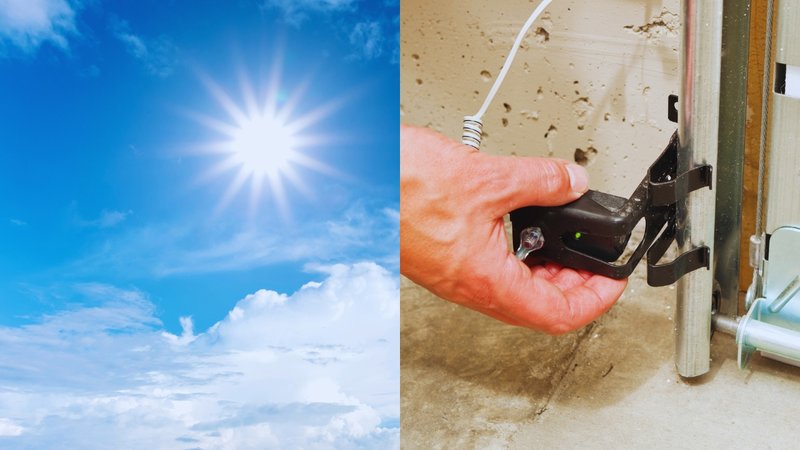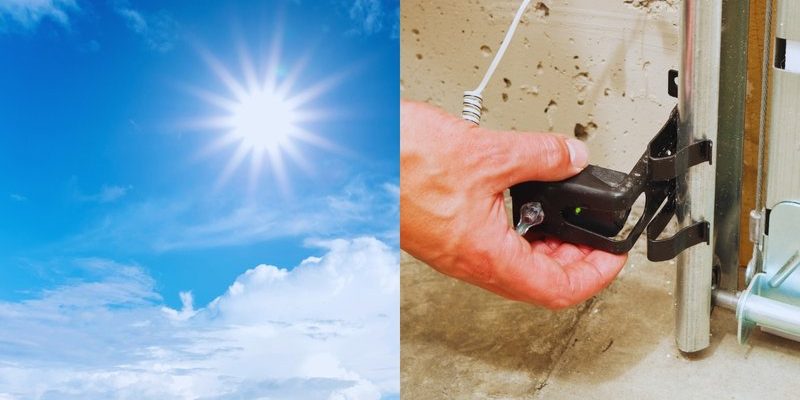
These sensors are super important for your safety and convenience. Brands like LiftMaster and Chamberlain have designed remotes and systems that rely on these sensors to operate smoothly. But direct sunlight can create a unique set of challenges that disrupt this harmony. In this article, we’ll dive deep into understanding how sunlight affects garage door sensors and explore practical solutions, including sun shields that can save you from daily headaches.
How Garage Door Sensors Work
To grasp why sunlight messes with your sensors, we should start with how these devices function. Garage door sensors, often found at the bottom of your garage door frame, use infrared light to detect objects in their path. When you press your remote, a signal is sent to the opener, and the sensors ensure no one or anything is in danger while the door operates. If a person, pet, or object interrupts this beam, the door stops and reverses, which is a crucial safety feature.
Now, sunlight can interfere with this infrared light. Think of it like trying to spot a flashlight in bright daylight. Even though the flashlight is on, it’s hard to see it among the competing light sources. Similarly, the sun’s rays can overpower the sensor’s signals, leading to false readings or, worse, the door not opening or closing at all. This disruption often leaves homeowners frustrated, thinking their garage door suddenly “forgot” how to function.
Why You Should Care About Sunlight Interference
You might be wondering why understanding sunlight interference is essential. Well, having a garage door that consistently malfunctions can be a real hassle. Imagine trying to leave for work or school, and your garage door refuses to budge because the sun is hitting the sensors just right. It could leave you feeling stuck, quite literally.
Moreover, constant issues with your sensors could lead to premature wear and tear over time. If the sensors get damaged from frequent false alarms or misreadings, it could necessitate costly repairs down the line. So addressing sunlight interference isn’t just about getting your door to work when you want; it’s also about preserving its longevity and ensuring safety.
Signs Sunlight Is Affecting Your Sensors
Let’s dive into some common signs that sunlight interference could be the culprit behind your garage door woes:
- Inconsistent operation: If your garage door operates just fine in the evening or cloudy days but acts oddly during bright, sunny hours, it’s a telltale sign.
- Frequent reversing: If the door opens but won’t stay open or constantly reverses, sunlight may be tricking the sensors into thinking something is in the way.
- No response: Sometimes, the door might refuse to respond entirely when the sun is shining directly on the sensors.
- Visible sensor alignment issues: If the sensors appear misaligned or are facing away from the door opening, sunlight can easily interfere with their function.
If you’re seeing these signs, it’s probably time to take a closer look at your garage door setup, especially during those peak sun hours.
Exploring Solutions for Sunlight Interference
Fortunately, there are effective solutions to mitigate sunlight interference with garage door sensors. Let’s explore some of these options so you can enjoy smooth operation and peace of mind.
1. Install Sun Shields
One of the most effective ways to combat sunlight interference is by installing sun shields. These simple, usually inexpensive shields can be mounted over the sensors to block direct sunlight. Think of them as an umbrella for your sensors.
When picking sun shields, look for materials that are durable and weather-resistant. You want something that can withstand the elements while effectively diffusing sunlight. Installation is often straightforward; just follow the product instructions, and you should be good to go!
2. Adjust Sensor Position
Sometimes, simply adjusting the position of your sensors can make a big difference. If your sensors are facing directly into the sun, try repositioning them slightly to reduce exposure. You might need to enlist a friend’s help or follow your manual for precise instructions.
In some cases, raising the sensors slightly off the ground can also help. Just be sure they’re still aligned properly to maintain their protection function.
3. Use Reflective Tape
Another creative solution is to apply reflective tape around the sensor area. The idea here is to redirect sunlight away from the sensor itself. You can find reflective tape at most hardware stores, and it usually comes in a strong adhesive form, making it easy to apply.
Just be careful not to cover the sensor entirely; you’ll want to ensure it remains operable while fending off the sun’s rays. This DIY approach can be effective without breaking the bank.
Tech Solutions: Upgrading Your Sensors
Consider upgrading your sensors if sunlight interference remains an ongoing issue after trying these solutions. Some newer models come equipped with advanced technology, including improved infrared detection that can withstand bright light more effectively.
Moreover, brands like LiftMaster and Chamberlain offer options that might be more resilient to sunlight disruption. If you’ve invested in consistent issues with your existing setup, moving to a more advanced model could be worth it.
The Role of Remote Controls in Sensor Operation
Your garage door’s remote control also plays a significant part in how well the sensors function. Low battery issues in a remote could lead to improper syncing with the sensors, which can be exacerbated by sunlight interference.
Make sure you regularly check and replace the batteries in your remote. A simple battery change may just resolve many problems you’re experiencing with your garage door. Take a quick look at the manual for instructions on getting your remote synced back to the system if something feels off.
Routine Maintenance to Prevent Issues
Routine maintenance can prevent many sensor-related issues, including those caused by sunlight. Here are some easy steps you can incorporate into your regular garage door inspections:
- Clean the sensors: Dust, dirt, or debris can also affect sensor performance. A clean cloth and mild soap can work wonders.
- Inspect the alignment: Regularly check that the sensors are aligned properly and pointing toward each other. Misalignment is a common issue.
- Check for obstructions: Make sure no items, like toys or leaves, are obstructing the sensor’s path.
- Schedule professional checks: If things get complicated, reaching out to a professional technician can help identify issues that might be hard to detect.
These simple steps can help prolong the life of your garage door system and ensure optimal performance.
When to Seek Professional Help
If you’ve tried all the DIY methods but are still struggling with sunlight interference or other sensor-related issues, it might be time to call in a pro. Technicians can offer a fresh perspective and troubleshoot problems you might overlook.
They have specialized tools and experience to assess various angles, including wiring issues or more technical aspects that could cause interference. When in doubt, remember that there’s no harm in asking for help!
Final Thoughts on Sunlight Interference and Solutions
Dealing with sunlight interference in your garage door sensors doesn’t have to be complicated or frustrating. By understanding how these systems work and implementing simple yet effective solutions—like sun shields, sensor adjustments, and routine maintenance—you can keep your garage door functioning smoothly.
Remember, it’s about making your life easier and ensuring that you can get in and out of your garage without a hassle, no matter how bright the day is. So go ahead, tackle those sunny days with confidence, knowing you have the tools to keep your garage door operating as it should. Happy parking!
